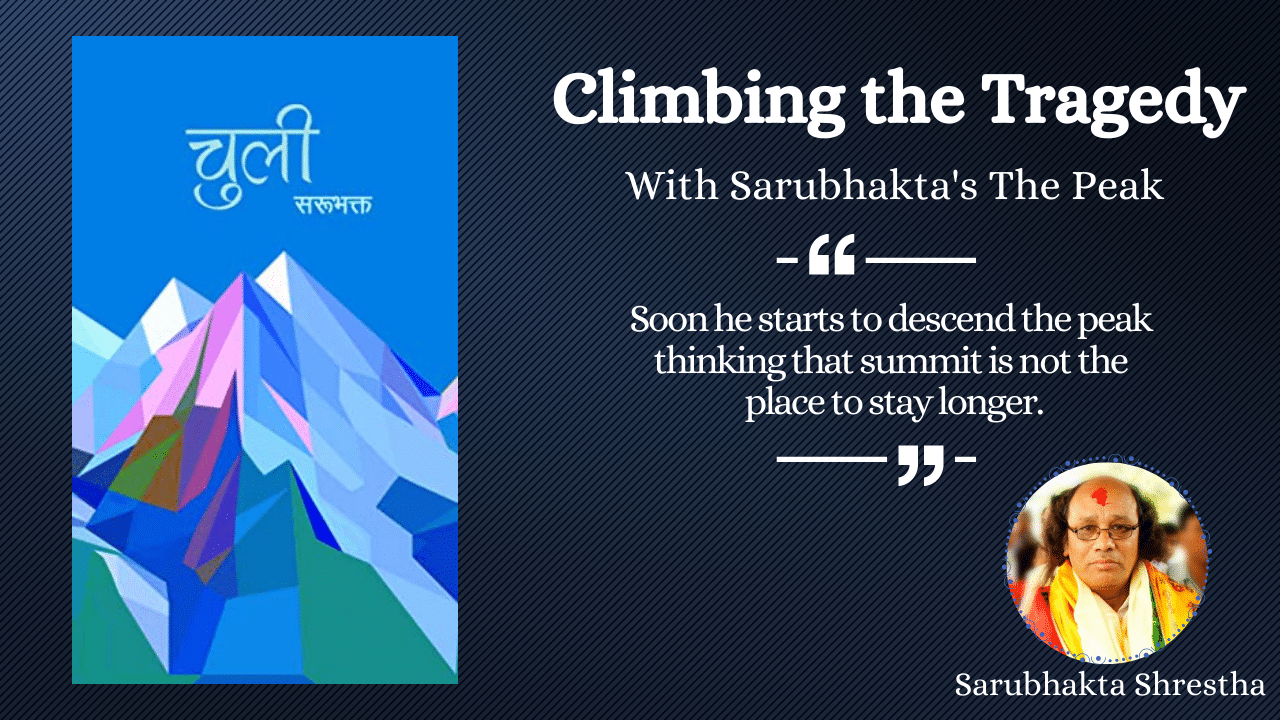
Climbing the Tragedy with Sarubhakta’s The Peak

ASHOK THAPA
October 3, 2020
Chulee (The Peak) is a philosophical novella-length work and is probably one-and-the-only mountaineering fiction written by a Nepali mainstream author.
Sarubhakta, who was born in the beautiful Pokhara city of Nepal, is a well-known name in Nepali literature. He writes poems, fiction, and plays that have contributing roles in modern Nepali literature. His bestselling works include Pagalbasti (1991), Taruni Kheti (1996), Samaya Trasadi (2001), Chulee (2003), and Pratigandha (2019).
Sarubkakta’s Pagalbasti won the Madan Puraskar in 1991. This is one of the most prestigious awards given to the best works in Nepali literature. Sarubhakta writes under the trend of human philosophy, existence, and nature. The nature connected to the culture, geography, and environment of Nepal.
Translated by Subhash Ghimire as ‘The Peak’ (2012), Chulee deals with the theme of natural and naturalism. Also included in the Nepali curriculum for the Tribhuvan University students, Chulee is the story of a mountain climber, who has one goal of reaching the top of the mountain, no matter what obstacles he will have to encounter on his way.
The entire novel presents the climber’s struggles and activities in a subtle way. Climbing Everest is not only exciting but also risky. The climber is greatly confident even though he is worried about possible complications in his journey. He thinks that the journey to the mountain is always a lonely journey. Succeed! This is his one goal when he starts his journey.
Amidst snowflakes, struggles, and avalanches, the climber finally reaches to the top of the Mount Everest, the world’s tallest mountain. Soon he starts to descend the peak thinking that the summit is not the place to stay longer. The climber thinks descending is more challenging than to ascend the Everest.
Most people don’t crash into failure, they crash into success, he thinks as he continues his journey back to the camp. As he descends from the base slowly and carefully, the atmosphere starts worsening when he reaches a little lower. Unable to face mother nature’s fury, the climber dies and the novel ends in a tragedy.
Chulee or ‘The Peak’ is a philosophical novella-length work and is probably one-and-the-only mountaineering fiction written by a Nepali mainstream author. There are some powerful philosophical and surrealistic lines in the novel. “Life is a beautiful poem of risks,” “Thorns pierce others but do not pierce themselves,” “Everything freezes in the mountains, but the heart does not,” “Life without a purpose is death,” “Death is not a purpose,” and “Life is all about playing hide and seek with accidents.” The novel presents many struggles with nature for survival.
Overall, the story of people’s lives, sorrow, and struggles living in the mountain regions have been presented in a minimal way in the novel. “Strength comes from struggle,” the novel seems to be saying.



Congratulations Asok g
I liked this novel even though it is small in size. Worth reading.
हाम्रा अति नै प्रिय अशोक थापा सरको अङ्ग्रेजी भाषामा लेखिएको लेख अति नै राम्रो लाग्यो । अझै यस्तो समिक्षात्मक लेखहरू पढ्न पाउ भन्दै सरलाई बधाई टक्राउद छु ।
CHULI…….very inspiring chronicle for the readers to perceive their dreams and slog to accomplish it. In spite of having access of numerous mountaineering fiction, this is the only fiction that has probably made the Nepalese readers to discern the beauty and the hardships of the mountain. The protagonist struggles against the nature’s deprivation lead us to the extreme endeavor of our life pursuing our happiness getting onto to the crest. The climax of the novel makes us feel that no matter how the awful life is our graceful exit can create a history of pride. We can mourn and have… Read more »